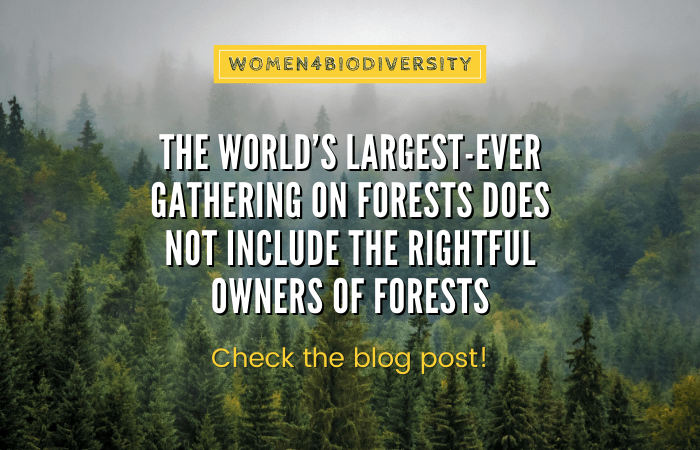Guest contributor – Gertrude Kabusimbi Kenyangi, SWAGEN Uganda
Seoul, May 2022
All roads led to Seoul, South Korea on the last day of April and the first day of May. It was time for the XV World Forestry Congress (WFC) hosted by the Government of the Republic of Korea from 2 to 6 May 2022.
Held at the COEX Convention and Exhibition Center in Seoul, the Congress brought together global forest stakeholders to review and analyze key challenges facing the sector and ways to address them. Participation was diverse, with representation from all regions and sectors; including the public and private sector, NGOs, CSOs, scientific or professional bodies, and forestry societies, as well as those who simply care about forests and the environment. Conspicuously absent were the Indigenous People who call forests home and the Local Communities who depend on the forests for their livelihood.
These two categories of people, usually referred to as Indigenous People and Local Communities (IPLC), have been erroneously referred to as stakeholders. Let us get this straight – IPLCs have ownership rights of forests. They are not one of many people with equal decision-making power, a definition of stakeholders! They are the rights holders to the naturally occurring biodiverse forests, period. Forests are sovereign spaces that should not be downgraded to multi-stakeholder platforms.
Held once every six years, the World Forestry Congress is nothing new. It has been held since 1926, with the first hosted by the Italian government. Food and Agriculture Organization’s involvement to organize and give the Congress context, however, only started in 1954.

The proponents of the World Forest Congress assert that it is a forum for the exchange of views and experiences on all aspects of forests and forestry, which may lead to the formulation of broad recommendations applicable at national, regional and global levels. XV WFC made recommendations, for instance:
The Seoul Forest Declaration urges that responsibility for forests should be shared and integrated across institutions, sectors and stakeholders – that word again – underlining that forests transcend political, social and environmental boundaries and are vital for biodiversity and the carbon, water and energy cycles in a planetary scale. True! However, there is cause for concern when monocrop plantations and the natural biodiverse bubbles of life that forests are, terrestrial ecosystems, where biotic and abiotic things have a symbiotic co-existence, are given a blanket definition of “forests.” Let’s call a spade a spade – monocrop plantations are not forests.
The Congress recognized the huge potential of forests to drive forward the 2030 Agenda helping achieve the Sustainable Development Goals (SDGs), including life on land (Goal 15), climate action (Goal 13), good health and well-being (Goal 3), sustainable cities and communities (Goal 11), responsible consumption and production (Goal 12), no poverty (Goal 1), and zero hunger (Goal 2). There were incessant calls for the need to triple investment in forest and landscape restoration globally by 2030 to meet internationally agreed commitments and targets on restoring degraded land.
While these calls were spot on, it begs the clarification: what kind of investment are they referring to? Is it the irresponsible, destructive and non-inclusive corporate controlled market mechanisms? Or is it the kind that recognizes the sovereignty of the forest indigenous people, is consultative and respects the Free, Prior and Informed Consent principle? The type that is not extractive but restorative?
Healthy, productive forests must also be maintained to reduce the risk of future pandemics and to provide other essential benefits for human physical and mental health, the Declaration stressed. One wonders how this will happen when Indigenous and traditional forest knowledge and customary governance systems have been overlooked or overridden, and scientific research is chronically underfunded. And yet, combining traditional and scientific knowledge would be essential for managing landscapes sustainably in an era of rising incidents of zoonotic diseases that bring the economy of the world to its knees. This is important especially now that we are still reeling from the effects of the COVID-19 pandemic.
One laudable outcome of the Congress is attempting at harmonizing the Multilateral Environment Agreements. The outcomes of the Congress, which also included the Youth Statement on Forests and the Ministerial Call on Sustainable Wood, were to be transmitted to the Conference of the Parties to the United Nations Convention to Combat Desertification (UNCCD COP 15), taking place on 9 – 20 May in Abidjan, Cote d’Ivoire, as well as the upcoming Conference of the Parties to the Convention on Biological Diversity (CBD) and Climate Change (UNFCCC), and other important fora. The World Forestry Congress was held under the theme “Building a Green, Healthy and Resilient Future.” However, without the correct reference to what is and what is not a forest, and who the rightful owners of the forests are, it remains to be seen how resilient the future will be for the next World Forest Congresses.


Gertrude Kabusimbi has a 20-year work experience in forest and biodiversity conservation right at the grassroots in Uganda. In recognition of her work, the UN Food and Agriculture Organization (FAO) awarded her the Collaborative Partnership on Forests, Wangari Maathai “Forest Champions” Award for 2015. She has been involved in the discourses surrounding the Convention on Biological Diversity since its inception, bringing a gender dimension and advocating for framing the CBD in its scientific as well as social identity. She is also a member of the Women and Gender Constituency of the UNFCCC as well as a member of the Women’s Major Group of the UN.

